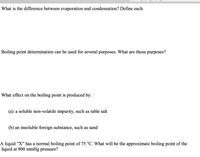
Chemistry
10th Edition
ISBN: 9781305957404
Author: Steven S. Zumdahl, Susan A. Zumdahl, Donald J. DeCoste
Publisher: Cengage Learning
expand_more
expand_more
format_list_bulleted
Concept explainers
Question

Transcribed Image Text:**Understanding Phase Changes and Boiling Point Influences**
**Evaporation vs. Condensation:**
- **Evaporation** is the process where liquid molecules gain enough energy to transition into a gaseous state, typically occurring at the surface of the liquid.
- **Condensation** is the reverse process where gas molecules lose energy and transition back into a liquid state.
**Boiling Point Determination:**
The determination of boiling points serves various purposes:
- Identifying or characterizing substances
- Assessing purity levels of a substance
- Assisting in the design and operation of distillation processes
**Effects on Boiling Point:**
- A **soluble non-volatile impurity**, such as table salt, generally increases the boiling point of a liquid due to the elevation of boiling point effect.
- An **insoluble foreign substance**, like sand, typically does not affect the boiling point significantly.
**Boiling Point Under Different Pressures:**
- For a liquid "X" with a normal boiling point of 75 °C, the boiling point can decrease when the pressure is reduced to 800 mmHg, as lower pressure typically lowers boiling points.
Expert Solution
This question has been solved!
Explore an expertly crafted, step-by-step solution for a thorough understanding of key concepts.
This is a popular solution
Trending nowThis is a popular solution!
Step by stepSolved in 2 steps

Knowledge Booster
Learn more about
Need a deep-dive on the concept behind this application? Look no further. Learn more about this topic, chemistry and related others by exploring similar questions and additional content below.Similar questions
- Please don't provide hand written solution.....arrow_forwardGiven the reaction between two gases represented by A2 and B2 to give the compound AB(g) A2(g) + B2 +B2(g) 2AB(g) At equilibrium, the concentration of A₂ = 3.0 × 10³M, of B₂ = 4.2×103 M, of AB = 2.8×103 M. If reaction takes place in a sealed vessel at 527°C, then the value of K, will be Options: (a) 2.0 (b) 1.9 (c) 0.62 (d) 4.5arrow_forward2. According to Le Chatelier's principle, it indicates where the balance is favored (Reactants or products) of the following unbalanced reaction H₂O(a) + Fe(s) + H₂(g) + Fe3O4(s) + Heat Write your answer on the line a) Decreases ia [H2): b) The temperature of the system decreases: c) The system pressure increases:arrow_forward
- A mixture consiting of 1.000 mol H2O(g) and 1.000 mol CO(g) is placed ina reaction vessel of volume 10.00 L at 800. K. At equilibrium, 0.665 mol CO2(g) is present as a result of the reaction CO (g) + H2O (g)⇋ CO2(g)+H2(g). What are the equilibrium concentrations for all substances?arrow_forwardA mixture of 2.75e-02 mol of O, 4.32e-02 mol of NOCI, 7.25e-02 mol of NO, and 7.59e-03 mol of Cly is placed in a 1.0-L steel pressure vessel at 1654 K. The following equilibrium is established: Ox(9) + 2 NOCI(9) =2 NO;(0) + Ch(9) At equilibrium 6.01e-03 mol of Clz is found in the reaction mixture. Calculate the equilibrium pressures of all gases in the reaction vessel and the value of Kp for the reaction. Pick the correct statement from the multiple choices, Use the value R= 0.0821 L-atm/mal-K for the gas constant. Oa) The equilibrium pressure of NOCI is PNoc 6.29 atm. O b) The equilbrium pressure of O2 is Po, 3.52 atm. O9 The equilbrium constant is Kp 9.2e-02. O4) The equibrum constant is Kp 2.2e+00. Oe) The equilibrium pressure of NO is PNo, 10.3 atm.arrow_forwardThe following table provides some information on carbon dioxide solubility in water. C P k T (mol/L) (atm) (mol/L atm) (°C) 3.70x10-2 1.00 20.0 9.50x10-2 Part A Part B {—| ΑΣΦ What pressure is required to achieve a CO₂ concentration of 9.50x10-² at 20°C? View Available Hint(s) 2.2852 Submit Previous Answers Part C 1.00 www. X Incorrect; Try Again; 5 attempts remaining 20.0 3.40x10-² 25.0 atm At 1 atm, how many moles of CO2 are released by raising the temperature of 1 liter of water from 20°C to 25°C? ►View Available Hint(s)arrow_forward
- For H₂(g) + Br₂ (g) — 2 HBr(g), K = 7.2 × 10−4 at 1362 K and AH° is positive. A vessel is charged with 48.8 Pa HBr, 1410 Pa H₂, and 3305 Pa Br₂ at 1362 K. Will the reaction proceed to the left or right to reach equilibrium? Oright left Calculate the pressure (in pascals) of each species at equilibrium.arrow_forwardGive detailed Solutionarrow_forward
arrow_back_ios
arrow_forward_ios
Recommended textbooks for you
 ChemistryChemistryISBN:9781305957404Author:Steven S. Zumdahl, Susan A. Zumdahl, Donald J. DeCostePublisher:Cengage Learning
ChemistryChemistryISBN:9781305957404Author:Steven S. Zumdahl, Susan A. Zumdahl, Donald J. DeCostePublisher:Cengage Learning ChemistryChemistryISBN:9781259911156Author:Raymond Chang Dr., Jason Overby ProfessorPublisher:McGraw-Hill Education
ChemistryChemistryISBN:9781259911156Author:Raymond Chang Dr., Jason Overby ProfessorPublisher:McGraw-Hill Education Principles of Instrumental AnalysisChemistryISBN:9781305577213Author:Douglas A. Skoog, F. James Holler, Stanley R. CrouchPublisher:Cengage Learning
Principles of Instrumental AnalysisChemistryISBN:9781305577213Author:Douglas A. Skoog, F. James Holler, Stanley R. CrouchPublisher:Cengage Learning Organic ChemistryChemistryISBN:9780078021558Author:Janice Gorzynski Smith Dr.Publisher:McGraw-Hill Education
Organic ChemistryChemistryISBN:9780078021558Author:Janice Gorzynski Smith Dr.Publisher:McGraw-Hill Education Chemistry: Principles and ReactionsChemistryISBN:9781305079373Author:William L. Masterton, Cecile N. HurleyPublisher:Cengage Learning
Chemistry: Principles and ReactionsChemistryISBN:9781305079373Author:William L. Masterton, Cecile N. HurleyPublisher:Cengage Learning Elementary Principles of Chemical Processes, Bind...ChemistryISBN:9781118431221Author:Richard M. Felder, Ronald W. Rousseau, Lisa G. BullardPublisher:WILEY
Elementary Principles of Chemical Processes, Bind...ChemistryISBN:9781118431221Author:Richard M. Felder, Ronald W. Rousseau, Lisa G. BullardPublisher:WILEY

Chemistry
Chemistry
ISBN:9781305957404
Author:Steven S. Zumdahl, Susan A. Zumdahl, Donald J. DeCoste
Publisher:Cengage Learning

Chemistry
Chemistry
ISBN:9781259911156
Author:Raymond Chang Dr., Jason Overby Professor
Publisher:McGraw-Hill Education

Principles of Instrumental Analysis
Chemistry
ISBN:9781305577213
Author:Douglas A. Skoog, F. James Holler, Stanley R. Crouch
Publisher:Cengage Learning

Organic Chemistry
Chemistry
ISBN:9780078021558
Author:Janice Gorzynski Smith Dr.
Publisher:McGraw-Hill Education

Chemistry: Principles and Reactions
Chemistry
ISBN:9781305079373
Author:William L. Masterton, Cecile N. Hurley
Publisher:Cengage Learning

Elementary Principles of Chemical Processes, Bind...
Chemistry
ISBN:9781118431221
Author:Richard M. Felder, Ronald W. Rousseau, Lisa G. Bullard
Publisher:WILEY